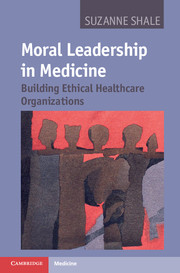Book contents
- Frontmatter
- Contents
- Preface
- Acknowledgements
- Chapter 1 Why medicine needs moral leaders
- Chapter 2 Creating an organizational narrative
- Chapter 3 Understanding normative expectations in medical moral leadership
- Prologue to Chapters 4 and 5
- Chapter 4 Expressing fiduciary, bureaucratic and collegial propriety
- Chapter 5 Expressing inquisitorial and restorative propriety
- Epilogue to Chapters 4 and 5
- Chapter 6 Understanding organizational moral narrative
- Chapter 7 Moral leadership for ethical organizations
- Appendix 1 How the research was done
- Appendix 2 Accountability for clinical performance: individuals and organizations
- Appendix 3 A brief guide to commonly used ethical frameworks
- Index
- References
Appendix 1 - How the research was done
Published online by Cambridge University Press: 05 January 2012
- Frontmatter
- Contents
- Preface
- Acknowledgements
- Chapter 1 Why medicine needs moral leaders
- Chapter 2 Creating an organizational narrative
- Chapter 3 Understanding normative expectations in medical moral leadership
- Prologue to Chapters 4 and 5
- Chapter 4 Expressing fiduciary, bureaucratic and collegial propriety
- Chapter 5 Expressing inquisitorial and restorative propriety
- Epilogue to Chapters 4 and 5
- Chapter 6 Understanding organizational moral narrative
- Chapter 7 Moral leadership for ethical organizations
- Appendix 1 How the research was done
- Appendix 2 Accountability for clinical performance: individuals and organizations
- Appendix 3 A brief guide to commonly used ethical frameworks
- Index
- References
Summary
This research began as an inquiry into the moral quandaries that medical leaders confronted, and the ways that medical leaders reasoned about them. It certainly remained a study of moral quandaries; but the focus of inquiry shifted towards moral narrative and behavioural propriety, rather than moral reasoning. How did this happen?
The complexities of designing worthwhile social research reflect a world that the poet Louis MacNiece described as ‘crazier and more of it than we think/Incorrigibly plural’. In this appendix, I explain how the arguments and conclusions of previous chapters have been shaped by the decisions I made in the course of planning and conducting the research. I endeavour to justify the research design, discuss its method and explain its conduct. I then clarify the methodological framework for the study, and the status of the conclusions that may be drawn from it.
- Type
- Chapter
- Information
- Moral Leadership in MedicineBuilding Ethical Healthcare Organizations, pp. 261 - 282Publisher: Cambridge University PressPrint publication year: 2011



